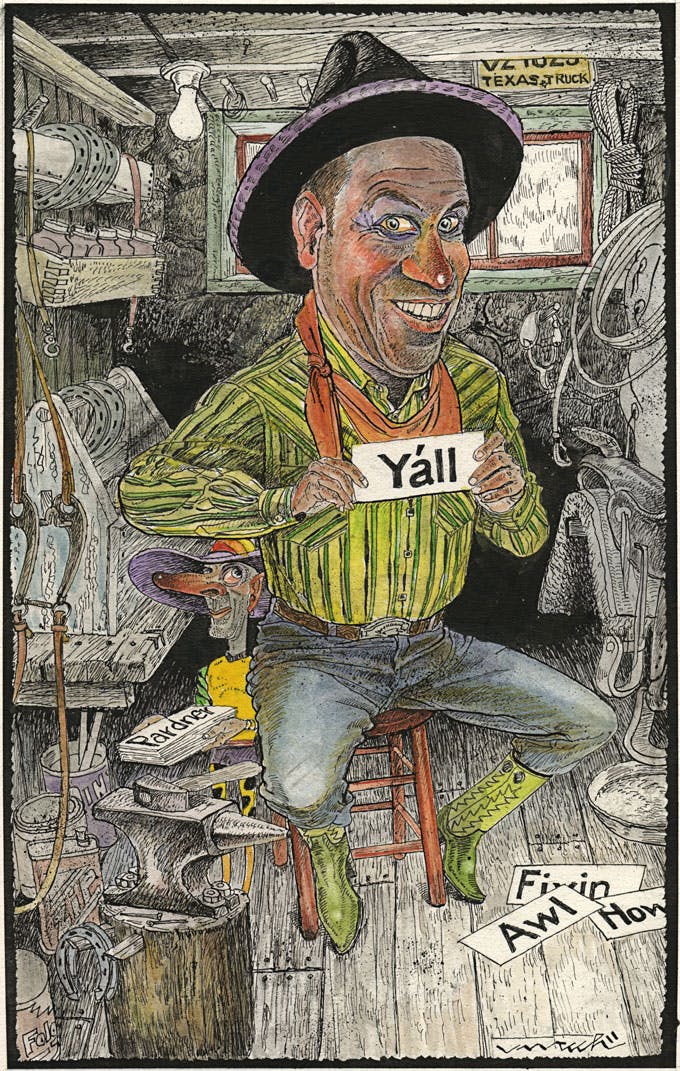
Q: My husband originally hails from Wisconsin, and I was raised in Indiana. After three years in the Lone Star State, we have become comfortable throwing a “y’all” or “fixin’ to” into our conversations at home, but we still feel a little unqualified to use these expressions in public. At what point, if ever, can we boldly use them around native Texans?
Kathy Steinke, Tomball
A: You are wise to be concerned about this. As with any patois, it is extremely rare for anyone other than the legitimate born-and-bred Texan to achieve complete mastery of the native tongue. But there are enough examples of zealous converts attaining near fluency (Ray Benson, Jerry Jeff Walker, George W. Bush) that you are encouraged to proceed—with caution. “Y’all” is generally accepted as a good introductory term for a would-be Texan undergoing the naturalization process. Its meaning is uncomplicated, it is easy to pronounce, and it is already in heavy usage throughout other regions of the country. Nevertheless, certain rules do apply. To begin with, the Texanist advocates a waiting period of no less than two years following relocation to Texas before initial public deployment of “y’all.” You and Mr. Steinke have met this requirement and may now move forth, but the Texanist advises you to stick to basic usage (e.g., “Excuse me, do y’all have a public restroom?”), as opposed to more complex forms such as the plural possessive (e.g., “Ma’am, where is y’all’s public restroom?”) or the exclamation (“There’s no public restroom? C’mon, y’all!”). These are best left to the natives. The Texanist further recommends advancing from “y’all” to “howdy” before attempting “fixin’ to” or, even more challenging, “yeehaw!” The fact that you have dedicated yourself to at-home immersion will no doubt speed the process.
Q: After Christmas dinner last year, my three sons-in-law all retreated to the master bedroom to watch football. We have plenty of chairs in the house, but there they were on the bed, cozy as three big, hairy bugs in a rug. Does the presence of televised sports make it acceptable for three grown men to share a bed?
Patricia M., Austin
A: The Texanist believes that the ethos of individual liberty should extend to the bedroom. He would therefore take issue with the implication that it may not be acceptable for three adult males to share a bed. That said, he gets your point. The phenomenon that you have described is usually witnessed but once or twice a year among full-grown, heterosexual males. Televised football is partially responsible, but it isn’t the sole explanation, as you rarely see the activity during regular NFL Sunday broadcasts. It takes a good feasting to really disable the inhibitions. After a few helpings of the sort of spread the Texanist imagines your family puts out for the holidays, it is, generally speaking, a medical imperative for a man to seek out a place where he can remove his shoes and lie supine. A couch may suffice, but if there’s a mattress in near proximity to a new 52-inch HD television tuned in to some professional pigskin, this will always result in two, three, or even four drowsy men together in a bed. Which is perfectly acceptable.
Q: I need a description of the Texanist’s procedures for starting fires. My wife, who hails from southeastern Europe, has been giving me lectures on her thousand-year-old best practices and is disturbing the chimney arts with a method that involves many small bags of hardwood twigs. Please wade in here, sir, because next it’s going to be how best to clean ducks!
Paul Ramsey, Ruston, Louisiana
A: The Texanist has a simple technique for indoor fire-starting that was handed down from his father, and probably his father before that. It calls for dry logs, some good kindling, a mountain of wadded-up newspaper, a lit match, and a few well-timed pumps of the bellows. Then, according to the Texanist’s family method, you must verbally assault the smoldering heap to achieve full ignition: “Come on, you sumbitch! Burn! Don’t you go out on me now, you little piece of . . . Burn, dammit! What the hell is wrong with you? Honey! I think this wood must be wet!” Usually, a flame will leap from the stack of logs just to shut you up. But the Texanist bets you have a different method. Maybe you give your logs a rub of paraffin wax like an old roommate of the Texanist’s used to do. Weird, but it worked every time. Or maybe you have gas assistance like the Texanist’s mother-in-law. The fact is that fire-starting—and duck-cleaning, for that matter—is a lot like cat-skinning. If you’re thinking, “Because done incorrectly, they can create quite a mess,” you are not wrong, but you have missed the point, which is that there is more than one way to do these things. The Texanist hopes you have a nice, warm winter in Ruston, Louisiana, with your southeastern European wife, whose small-bags-of-twigs approach probably works just fine.
Q: My husband usually takes our eleven-year-old son to get his hair cut at the local barbershop, but recently, my husband was out of town, and I took our son in myself. I was shocked to see the place littered with girlie magazines. Granted, all the barbers and clients are male, but is it okay for an eleven-year-old to be subjected to such material?
Name Withheld
A: The Texanist understands your concern but cautions against taking your son to the mall for his haircuts. This would be a disservice to the boy, who, whether he knows it or not, is getting more than a fairly priced trim. The air in a barbershop is thick not just with the smell of manly tonics but also with spirited male conversation, the ins and outs of which your son will be well served to master. Why don’t you simply ask your husband to keep an eye on the boy during the next cut? If he happens to spy a portion of a cover of an age-inappropriate glossy, perhaps it can be used as a pretext for a conversation that is lurking in your husband’s near future anyway. Of course, you could also buy the shop a dozen subscriptions to TEXAS MONTHLY to help dilute the less suitable material.








